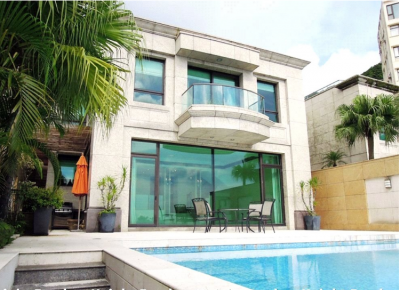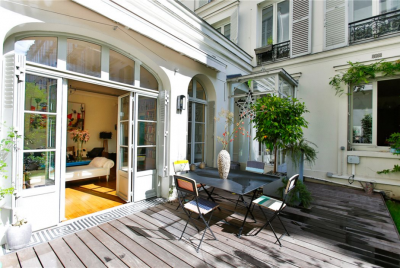 Water Mill, NY home via Knight Frank
Water Mill, NY home via Knight Frank
Across global nations, housing prices increased by 3.4 percent in the year-long period ending March 31, Knight Frank’s Global House Price Index shows.
The growth rate is comparable to the increase Knight Frank found in prime global cities, suggesting stability on both regional and national scales. While major players are stumbling amid geopolitical volatility, a surge in Nordic markets has buttressed the overall market.
"In Australia, the introduction of fees for foreign buyers seen in December 2015 combined with record high debt to income ratios has led to a softening in price growth," said Taimur Khan, senior research analyst at Knight Frank.
"Sweden has seen a number of factors contribute its increase in house prices, chief among them being a further reduction in the base rate in February from -0.35 percent to -0.50 percent, providing access to cheaper finance and fueling demand," he said. "Low levels of new completions combined with a growing population are also contributing to price growth."
Slowdown in Asia
While the PPP-weighted 3.4 percent number is promising, top performers and high-priced markets are cooling. In Asia, Singapore, Hong Kong and Taiwan have all seen price declines over the 12-month period.
These price declines range from a -3.1 percent in Singapore to the more sizable drops of 5.2 percent and 6 percent in Hong Kong and Taiwan, respectively. Japan also posted a drop, three-tenths of a percentage point, though China posted moderate gains of 3.1 percent as the regional highmark.
 Hong Kong home
In the United States and United Kingdom the outlook appears better, with increases of 5.2 percent and 5.3 percent overall. However, the recent quarter has seen both countries grind to a halt, with uncertainty over the Brexit initiative and the U.S. presidential election putting buyers on edge.
The impact of each vote on the respective housing market remains to be seen, though many experts say the unpredictability of either leaving the European Union or a Trump presidency (see story) will have a negative economic impact.
Turkey’s growth of more than 15 percent comfortably sits atop the chart, though it represents a noticeable decline over the past quarter. Turkey has been the site of multiple terrorist attacks by both ISIS and the PKK over the past several months.
Additionally, Russia has mounted sanctions in response to a Turkish fighter jet shooting down a manned Russian plane, and the mounting authoritarianism of Turkey's president Recep Tayyip Erdoğan has cast further uncertainty and fear in the region.
Other emerging markets are faring worse, however, with the rising value of the U.S. dollar and slowing wages bringing the BRIC market to a 3 percent average growth, down from 11 percent in 2012. South Korea, Brazil and Russia are also stagnating, though Indonesia, at 4.2 percent growth, has steadily picked up steam over the same period.
New Zealand’s 11 percent increase is good for third among all countries on the list, but also shows the country slipped over the final six months of the period in light of a decelerating economy and a law change requiring higher deposits.
Hong Kong home
In the United States and United Kingdom the outlook appears better, with increases of 5.2 percent and 5.3 percent overall. However, the recent quarter has seen both countries grind to a halt, with uncertainty over the Brexit initiative and the U.S. presidential election putting buyers on edge.
The impact of each vote on the respective housing market remains to be seen, though many experts say the unpredictability of either leaving the European Union or a Trump presidency (see story) will have a negative economic impact.
Turkey’s growth of more than 15 percent comfortably sits atop the chart, though it represents a noticeable decline over the past quarter. Turkey has been the site of multiple terrorist attacks by both ISIS and the PKK over the past several months.
Additionally, Russia has mounted sanctions in response to a Turkish fighter jet shooting down a manned Russian plane, and the mounting authoritarianism of Turkey's president Recep Tayyip Erdoğan has cast further uncertainty and fear in the region.
Other emerging markets are faring worse, however, with the rising value of the U.S. dollar and slowing wages bringing the BRIC market to a 3 percent average growth, down from 11 percent in 2012. South Korea, Brazil and Russia are also stagnating, though Indonesia, at 4.2 percent growth, has steadily picked up steam over the same period.
New Zealand’s 11 percent increase is good for third among all countries on the list, but also shows the country slipped over the final six months of the period in light of a decelerating economy and a law change requiring higher deposits.
 House for sale in Paris via Knight Frank
Europe is also lagging – 12 of the 20 slowest countries are European – but some Baltic nations and particularly Nordic countries are surprise hotspots. Sweden’s 12.8 percent growth on the year places it second behind Turkey, while Iceland and Denmark posted 6.7 and 6.2 percent growth rates, respectively.
Latvia, Norway and Bulgaria are also trending up, while Hungary’s 4.3 percent 12-month change is hindered by a -7.1 percent change from Q3 2015-Q1 2016 and a -8 percent change from Q4 2015-Q1 2016.
New players
Canada is also growing at a considerable 7 percent by Knight Frank’s measure, good for eleventh on the index.
Real estate advisors believe that foreign buyers purchase at least a quarter of Canadian luxury properties, a shift resulting in part from the weakening Canadian dollar and strengthening U.S. dollar.
When asked about changes in the market, two-thirds of advisors surveyed for a Royal LePage report say foreign buyer activity has increased, with 24 percent saying foreign buyers account for at least 25 percent of properties. Canada’s culture, laws and currency suggest that the trend will continue throughout the year (see story).
House for sale in Paris via Knight Frank
Europe is also lagging – 12 of the 20 slowest countries are European – but some Baltic nations and particularly Nordic countries are surprise hotspots. Sweden’s 12.8 percent growth on the year places it second behind Turkey, while Iceland and Denmark posted 6.7 and 6.2 percent growth rates, respectively.
Latvia, Norway and Bulgaria are also trending up, while Hungary’s 4.3 percent 12-month change is hindered by a -7.1 percent change from Q3 2015-Q1 2016 and a -8 percent change from Q4 2015-Q1 2016.
New players
Canada is also growing at a considerable 7 percent by Knight Frank’s measure, good for eleventh on the index.
Real estate advisors believe that foreign buyers purchase at least a quarter of Canadian luxury properties, a shift resulting in part from the weakening Canadian dollar and strengthening U.S. dollar.
When asked about changes in the market, two-thirds of advisors surveyed for a Royal LePage report say foreign buyer activity has increased, with 24 percent saying foreign buyers account for at least 25 percent of properties. Canada’s culture, laws and currency suggest that the trend will continue throughout the year (see story).
 West Vancouver, British Columbia, Canada home
According to a Christie’s International Real Estate report, stagnation in the luxury real estate market of the world’s biggest cities is counterbalanced by the emergence of new hubs.
London and New York have slowed down recently, but less prominent markets that were slower recovering from the recession are continuing to perform admirably. With the post-recession boom over, exchange rates and a host of other political and financial concerns have shaken up the market, creating opportunities and challenges heavily dependent on geography (see story).
"Oil price has been important for developing markets in particular, predominantly those countries where the currency is well correlated to the oil price," Mr. Khan said. "Going forward the prospect of a hike in rates by the U.S. Federal Reserve will be worrying for emerging markets, as this will lead to an increase in borrowing costs in emerging markets."
West Vancouver, British Columbia, Canada home
According to a Christie’s International Real Estate report, stagnation in the luxury real estate market of the world’s biggest cities is counterbalanced by the emergence of new hubs.
London and New York have slowed down recently, but less prominent markets that were slower recovering from the recession are continuing to perform admirably. With the post-recession boom over, exchange rates and a host of other political and financial concerns have shaken up the market, creating opportunities and challenges heavily dependent on geography (see story).
"Oil price has been important for developing markets in particular, predominantly those countries where the currency is well correlated to the oil price," Mr. Khan said. "Going forward the prospect of a hike in rates by the U.S. Federal Reserve will be worrying for emerging markets, as this will lead to an increase in borrowing costs in emerging markets."
